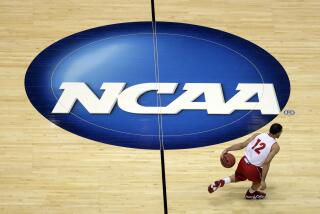Commentary : Payday for Tarkanian: Better Late Than Never
WASHINGTON — Defense has been Jerry Tarkanian’s specialty. On the court, it is the main reason his career winning percentage ranks second in college basketball history. The legends immediately behind Tarkanian are, in order, Adolph Rupp, John Wooden and Dean Smith.
In the courts, Tarkanian has done even superior defensive work. He took close to the mightiest of the sporting mighty, the NCAA itself, through all manner of legal traps and stalls -- and into something like 12 years of overtime.
And he lost. Tarkanian’s latest rare defeat, on Monday, came as most basketball-related ones seem to. He no longer had the home-court advantage. Still, he kept it close, the Supreme Court ruling for the NCAA by 5-4.
This was a case more important than noble, and it got Tarkanian out of sports and onto the front pages of many influential newspapers. Tarkanian was exactly the proper person to be involved in establishing the NCAA’s right to order a school to suspend a coach for assorted rules violations; the NCAA has been chasing him for the better part of two decades.
He was coach at Long Beach State from 1969 through 1973. On Jan. 6, 1974, the school was placed on a three-year probation for basketball and football violations that included excessive financial aid, fraudulent test scores, tampering with transcripts and erroneous eligibility certificates.
By that time, Tarkanian was at Nevada-Las Vegas. After the NCAA discovered 38 violations, it placed the Runnin’ Rebels on probation for two years and told the school to suspend Tarkanian for that period.
Tarkanian then sued the school and the NCAA, arguing that the two were acting as partners and that his constitutional rights had been violated. He won at every level through the Nevada Supreme Court.
Had Tarkanian been suspended, he could have retained his tenured position at the university. But he would have had to forfeit, among other things, a six-figure salary that included fees from endorsements and camps, a newspaper column, radio and television shows and 10 percent of the net proceeds from participation in the NCAA tournament.
So principle was not the only force that drove Tarkanian to court. Nevada-Las Vegas made the NCAA’s Final Four two years ago, which means that his share of the take was close to $100,000. Professor Tarkanian would have commanded far less.
The NCAA decided to keep appealing each lower-court setback, just in case every coach in the sports that matter did not become pure as the driven snow and all cheating suddenly ceased.
“If (the NCAA) had lost,” said Rex E. Lee, who represented the NCAA before the high court, “(it) would have had to use something like trial-type proceedings, which would have cost more, been less effective and not served the purposes of the NCAA or the individual schools.
“We are now back where we were about 12 years ago.” Meaning that Coach Tarkanian might have to become Professor Tarkanian for two years after all.
There would seem to be no switch-schools escape this time, because of an NCAA rule passed about three years ago, perhaps with Tarkanian in mind. A school that hires a coach responsible for another one being on probation now risks sanctions for hiring him.
The NCAA ought to nail Tarkanian. A two-season sabbatical, 12 years late, would be entirely appropriate. I thought otherwise until considering how Tarkanian has prospered from presenting himself for so long as America’s Oppressed Coach, a Father Flanagan who chews towels.
Tarkanian in some ways is good for college basketball, compelling even, mainly by being close to unique as a coach and character. He takes players nearly all other coaches reject and usually gets them to play hard and with discipline.
He now figures to affect an even more put-upon appearance, of a well-intentioned coach who has suffered for a dozen years in and out of court. Why make the poor man endure more?
Well, partly because Tarkanian has made a handsome living as a roguelike coach, even co-authored a recently published book (“Tark: College Basketball’s Winningest Coach”).
In his own way, Tarkanian has become as seemingly untouchable as some of the schools he charged over the years have been. He insisted the NCAA wouldn’t dare nail UCLA; it eventually did. Same with Kentucky, which may have cheated so blatantly that even an agency as hamstrung as the NCAA cannot avoid a conviction.
As its lawyers and other defenders know, the NCAA does not have available for its investigations many of the usual legal tools; the power of subpoena, for instance.
To a great extent, the NCAA must rely on the integrity of its members. And with such staggering amounts of money involved for bowl games in football and the NCAA tournament in basketball, college officials often choose to fight rather than cooperate during investigations.
Possibly, as he has insisted, Tarkanian and his schools were vulnerable and sacrificial at one time, obvious targets for an undermanned enforcement staff and not so cunning as many basketball factories. No longer. Among active coaches, Tarkanian entered this season first in winning percentage (.825) and seventh in total victories (501).
Seems to me, Tarkanian has done rather nicely these last 12 years. Seems to me, his upward mobility has not been interrupted in the least. Seems to me, he slipped away from justice before, at Long Beach State. Seems to me that twice would be once too often.
More to Read
Go beyond the scoreboard
Get the latest on L.A.'s teams in the daily Sports Report newsletter.
You may occasionally receive promotional content from the Los Angeles Times.










